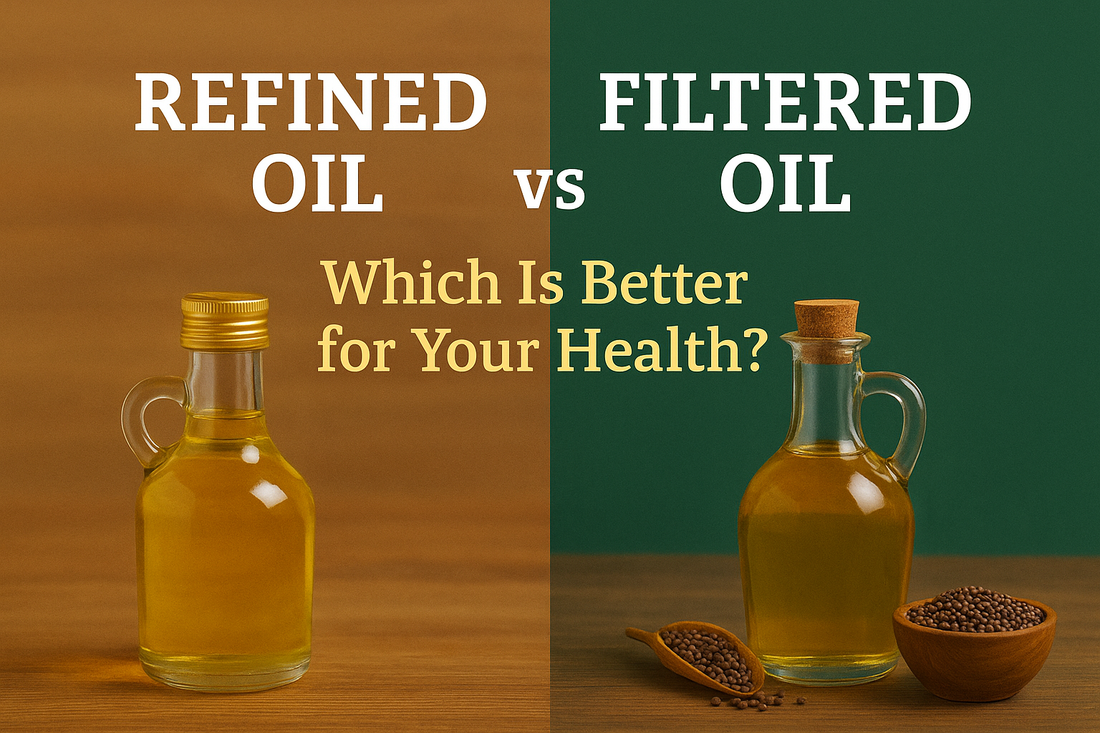
Refined Oil vs Filtered Oil: Which Is Better for Your Health?
Share
Cooking oil is a staple in every Indian kitchen. While some households prefer refined oils like sunflower, soybean, or rice bran, others choose traditional filtered oils such as mustard, groundnut, or sesame. The debate on refined oil vs filtered oil is not new, but recent shifts in consumer awareness have brought it back into the spotlight.
What Is Refined Oil?
Refined oil is produced through mechanical and chemical processing. Seeds or nuts are crushed, the oil is extracted with heat and solvents, and then treated in multiple steps—neutralization, bleaching, and deodorization. These processes make the oil stable and long-lasting.
Key features of refined oil:
-
Neutral flavor and aroma that does not interfere with dishes
-
Higher smoke point, suitable for frying and roasting
-
Longer shelf life due to chemical treatment
-
Mandatory fortification with Vitamin A and D under FSSAI norms in India
What Is Filtered Oil?
Filtered oil, often called cold-pressed or kachi ghani oil, is extracted using traditional methods like wooden presses or ghanis. The oil is only filtered to remove suspended particles, and no chemicals or heat are applied during extraction.
Key features of filtered oil:
-
Retains natural antioxidants and Vitamin E
-
Strong aroma and distinct flavor linked to its source seed or nut
-
Lower smoke point, best for sautéing, tadka, and raw use in salads or chutneys
-
Shorter shelf life compared to refined oils
Refined Oil vs Filtered Oil: Nutritional and Cooking Comparison
|
Aspect |
Refined Oil |
Filtered Oil |
|
Processing |
High heat and chemical refining |
Natural, cold-pressed, minimal processing |
|
Nutrient Retention |
Some nutrients lost, fortified later |
Retains antioxidants and bioactive compounds |
|
Smoke Point |
High, ideal for deep frying |
Low to medium, not for repeated frying |
|
Flavor |
Neutral and odorless |
Strong, authentic taste |
|
Shelf Life |
Long-lasting |
Shorter |
|
Health Impact |
Depends on fatty acid composition |
Less processed, closer to natural form |
Is Refined Oil Good for Health?
The health effects of refined oil depend on its fatty acid profile. Oils rich in unsaturated fats such as rice bran, canola, or sunflower can support cholesterol management and heart health. Refined oils with higher saturated fats, such as palm oil, should be limited.
The main concern with refined oils is the practice of overheating or reusing them, which can lead to harmful compound formation. When used properly and in moderation, refined oils are not automatically unhealthy.
Why Filtered Oils Are Preferred in Traditional Kitchens
Filtered oils have been a part of Indian cooking for generations. Oils like mustard, groundnut, sesame, and coconut are widely used in regional cuisines. Their natural aroma, flavor, and antioxidant content make them popular among health-conscious consumers.
Ayurvedic practices also recognize filtered and cold-pressed oils as beneficial for digestion, immunity, and overall wellness. With increasing awareness, many households are switching back to these oils for everyday cooking.
Choosing Between Refined Oil and Filtered Oil
-
For frying and high-heat cooking: Refined oils with a high smoke point such as rice bran or groundnut oil work well.
-
For everyday meals: Filtered oils like mustard, sesame, or coconut add flavor and retain nutrients.
-
For balance: A rotation of 2–3 oils ensures diversity in MUFA, PUFA, and omega-3 intake.
-
For moderation: As per ICMR-NIN, visible oil intake should remain around 20–30 grams per person per day.
The Anveshan Perspective
At Anveshan, oils are prepared using traditional wood-press methods that preserve natural taste and nutrition. Small-batch production, chemical-free processing, and authentic sourcing ensure every bottle of oil supports healthier cooking practices.












 You saved ₹-48 on this order
You saved ₹-48 on this order

